Materiality and KPIs
We introduce the five material issues of the Teijin Group, and the key performance indicators (KPIs) and target values.
Materiality of the Teijin Group
Materiality is social issues that we prioritize in our actions to realize our long-term vision of being a company that supports the society of the future.
In Medium-Term Management Plan 2020-2022, based on global social issues and the goals set forth in the Sustainable Development Goals (SDGs), we have organized risks and opportunities that our company faces and identified five material issues to be addressed as management issues from FY2020 onward.
Under the Reforms for Profitability Improvement initiative, announced in February 2023, our materiality has remained unchanged, and we aim to accelerate our transformation into a company that resolves important social issues in the post-pandemic world.
Materiality and SDGs
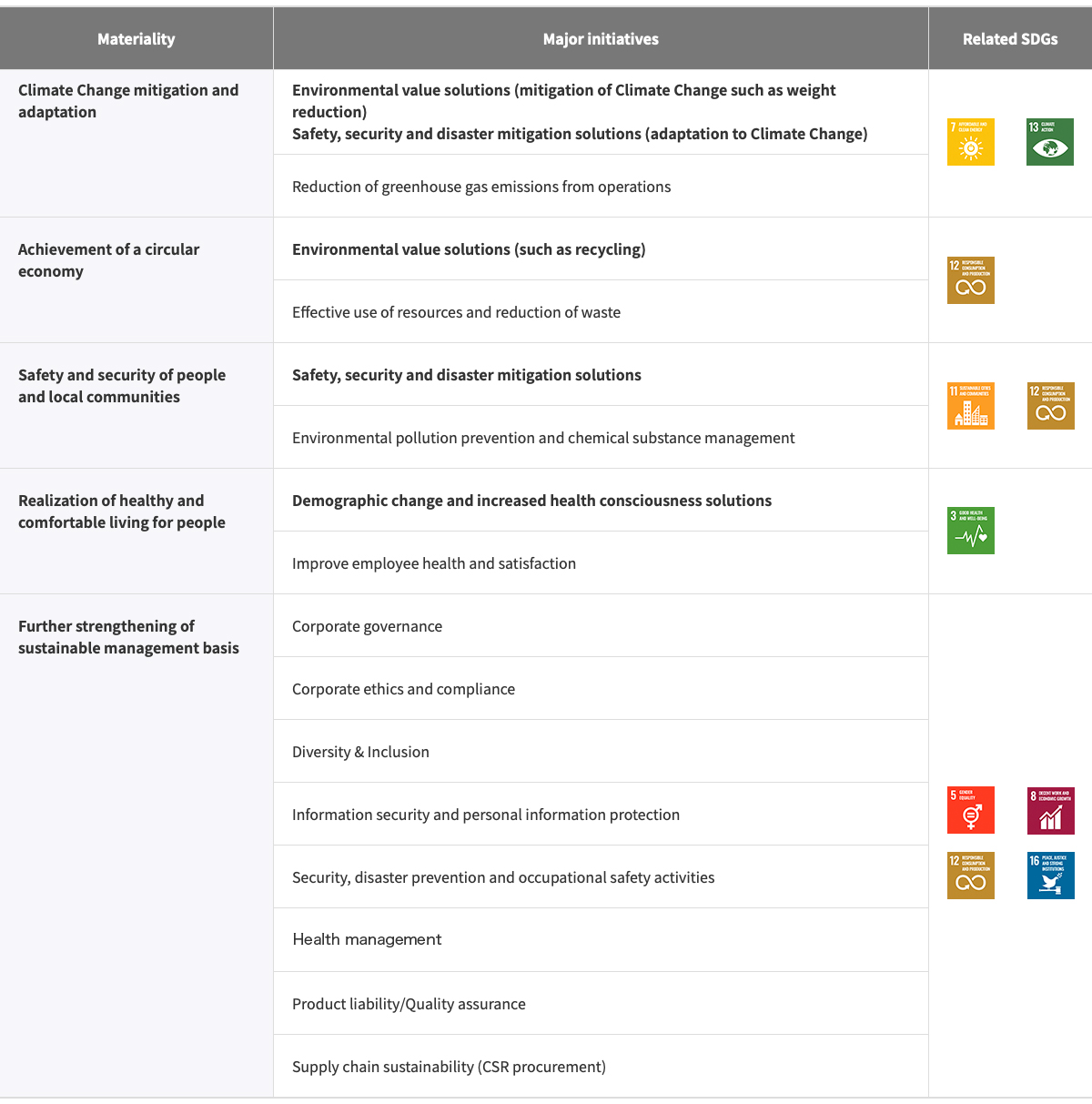
Learn more about materiality here
Process of identifying materiality
The Teijin Group grasps a wide range of social issues and screens them by conducting a materiality analysis from the perspective of their degree of importance to the Teijin Group and degree of impact on stakeholders. The Chief Sustainability Officer (CSO) then consults with external experts. The Teijin’s Group Management Committee finally identifies the materiality to the Teijin Group.

STEP1 Grasp and screen
Grasp the trends of a wide range of social issues including the SDGs, and digest them
STEP2 Analyze materiality
The digested social issues are analyzed and mapped two-dimensionally, with importance of the social issues to the Teijin Group in ascending order along the horizontal axis, and impact on stakeholders in ascending order along the vertical axis.
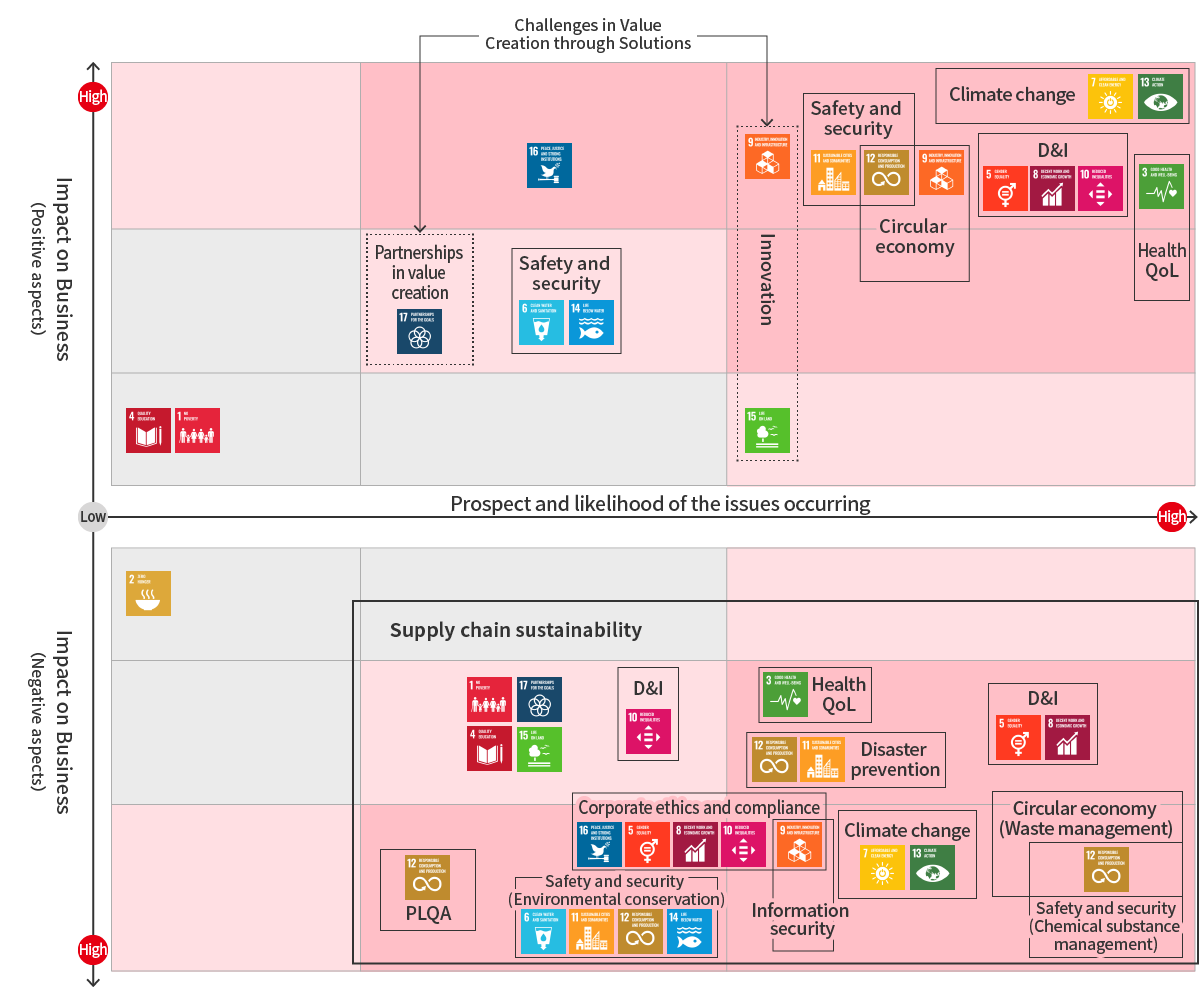
STEP3 Select material issues
From the issues analyzed in STEP2, we select those which have a particularly high importance to the Teijin Group and a high degree of impact on stakeholders.
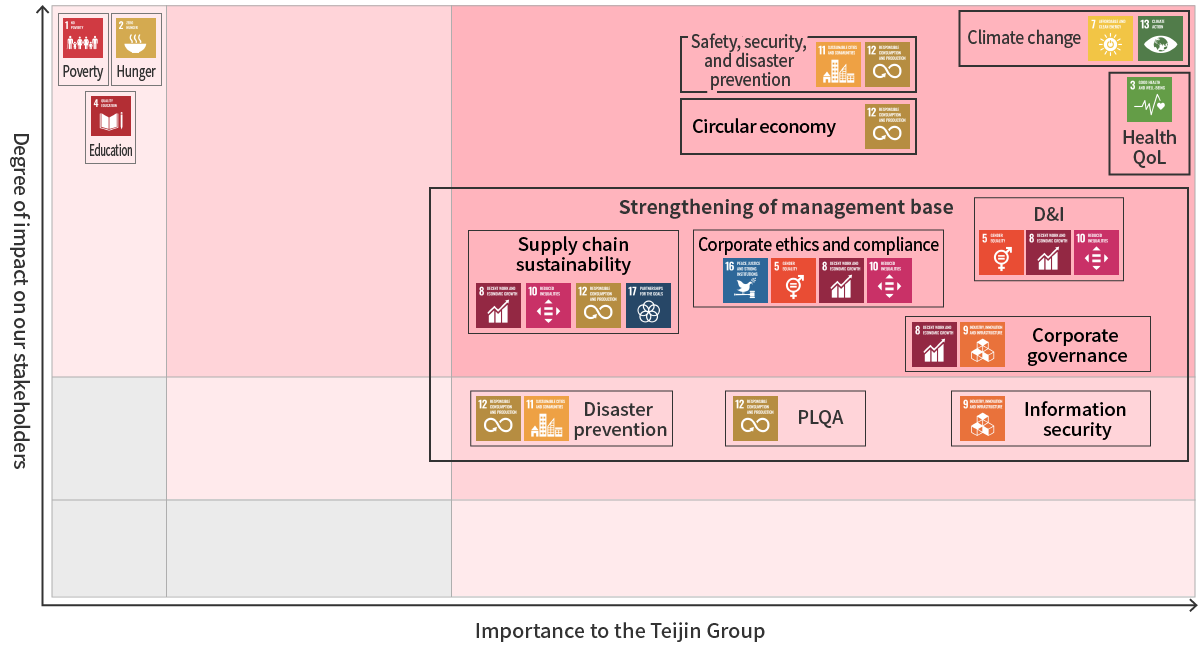
STEP4 Dialogues with external experts
We conduct dialogues with external experts about the Teijin Group’s process of identifying Materiality and the selected issues.
Details of Implementation
We conducted dialogues about the Group’s process of identifying materiality and the selected issues in October 2019, and received inputs from external experts from a wide range of perspectives.
Connecting business fields with solutions helps improve corporate value
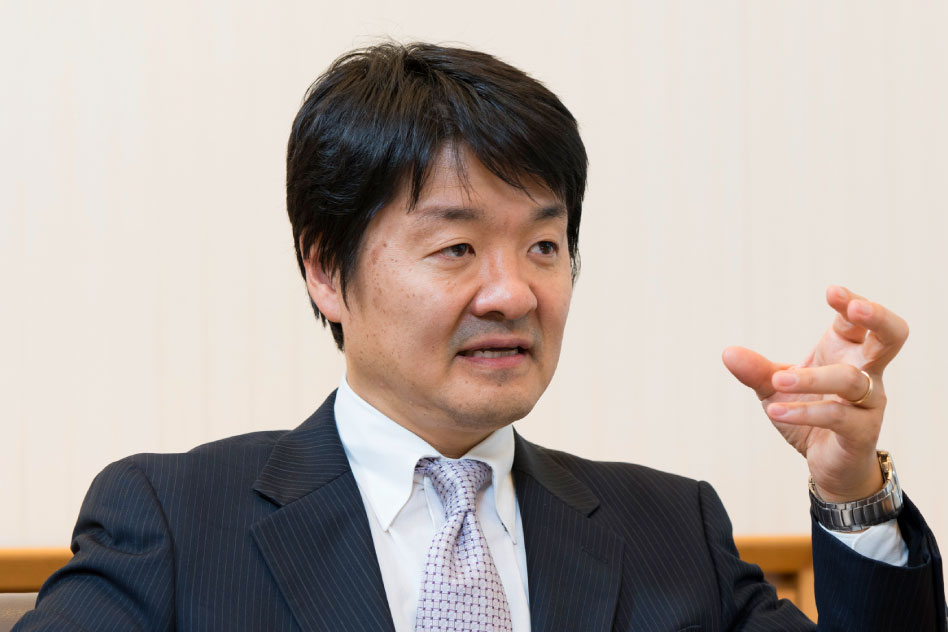
Director,
Lloyd’s Register Japan K.K.
(As of October 2019)
When organizing its materiality with a focus on the SDGs, I believe Teijin can establish a greater sense of a narrative by showing how its three solutions, which are created as a result of its business activities, contribute to society. In addition, Teijin should be able to enhance its corporate value to an even greater extent by extending a particular material or business across multiple solutions. I also think it is important for each employee to gain an understanding on the kind of business opportunities that are created by responding to the SDGs.
Backcasting from the future with a view to the next 100 years is important
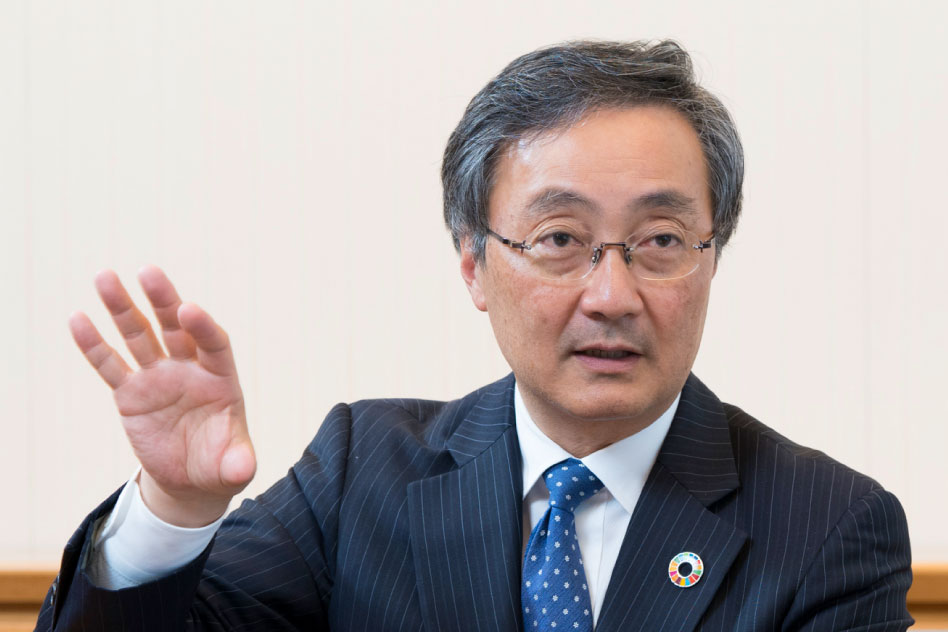
Founding Partner & Chairman of the Board,
Commons Asset Management, Inc.
(As of October 2019)
From the viewpoint of a long-term investor, the purpose of a corporation’s efforts toward ESG and the SDGs is to achieve sustainable value creation over the long term. To that end, it is important to accumulate existing businesses and make commitments to the future and then think backwards on how to accomplish them. In addition to considering “what” actions it should undertake, Teijin should think about “why” they are pursuing a particular action. I therefore would like to see Teijin promote backcasting with a focus on the next 100 years. Going forward, the extent to which Teijin can ascertain changes in the business environment and consider aspects outside the perspective of its past successes will become increasingly more important.
Looking forward to long-term value creation related to climate change
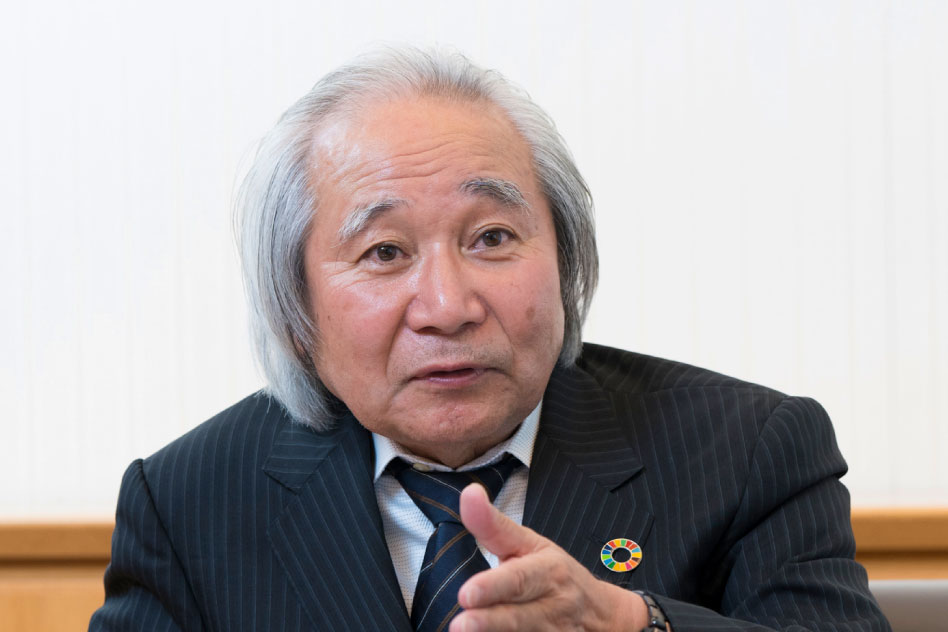
Chief Executive Officer, Sustainability Forum Japan
Board Member, Global Compact Network Japan
(As of October 2019)
From a short-term perspective too, Teijin deserves praise for supporting the Task Force on Climate-related Financial Disclosures (TCFD). I think the Company could benefit from adopting a more long-term perspective with its vision and strategies. I would like to see Teijin establish goals for 2030 through a backcasting approach that considers the kind of company Teijin aims to be by its 150-year anniversary. If Teijin’s management is able to indicate the direction toward which the Company is heading, I believe that knowledge of this path will spur various ideas from employees on how to reduce CO2 emissions and other matters. To survive as a company going forward, it is crucial to pursue efforts from the perspective of value creation related to climate change.
Key dialogues held in the past
- Dialogue on human rights with external experts (FY2021)
- Dialogue on human rights with external experts (FY2020)
- Dialogue on human rights with external expert (FY 2019)
- Corporate Governance Talk (FY 2018)
- Promoting of Diversity & Inclusion (FY 2017)
- Materiality Initiatives (FY2016)
- Holding a consultation about CSR procurement (FY2015)
- Identify Material CSR Issues (FY2014)
- True Diversity -- The Next Step in the Advancement of Female Employees (FY2013)
- How Teijin Aramid Creates Qualitative Value in the Chain (FY2012)
- CSR in Disasters (FY2011)
- How Should Environmental Initiatives for China be Structured? (FY2010)
- Toward Better Home Oxygen Therapy (FY2009)
- Toward Expanding ECO-CIRCLE® (FY2008)
- Operation of the Environmentally Friendly Design Guidelines (FY2007)
- Promotion of ECO-CIRCLE (FY2006)
STEP5 Identify material issues
The Group Management Committee deliberates, checks, and identifies the Teijin Group’s materiality. The current five material issues were identified at the Group Management Committee in December 2019.
KPIs & Target
The KPIs for each material issue set by the Teijin Group are indicated below.
Reduction in environmental burden
We have maintained the KPIs we adopted for reducing our environmental burden under Medium-Term Management Plan 2020-2022 (certain figures have been raised).
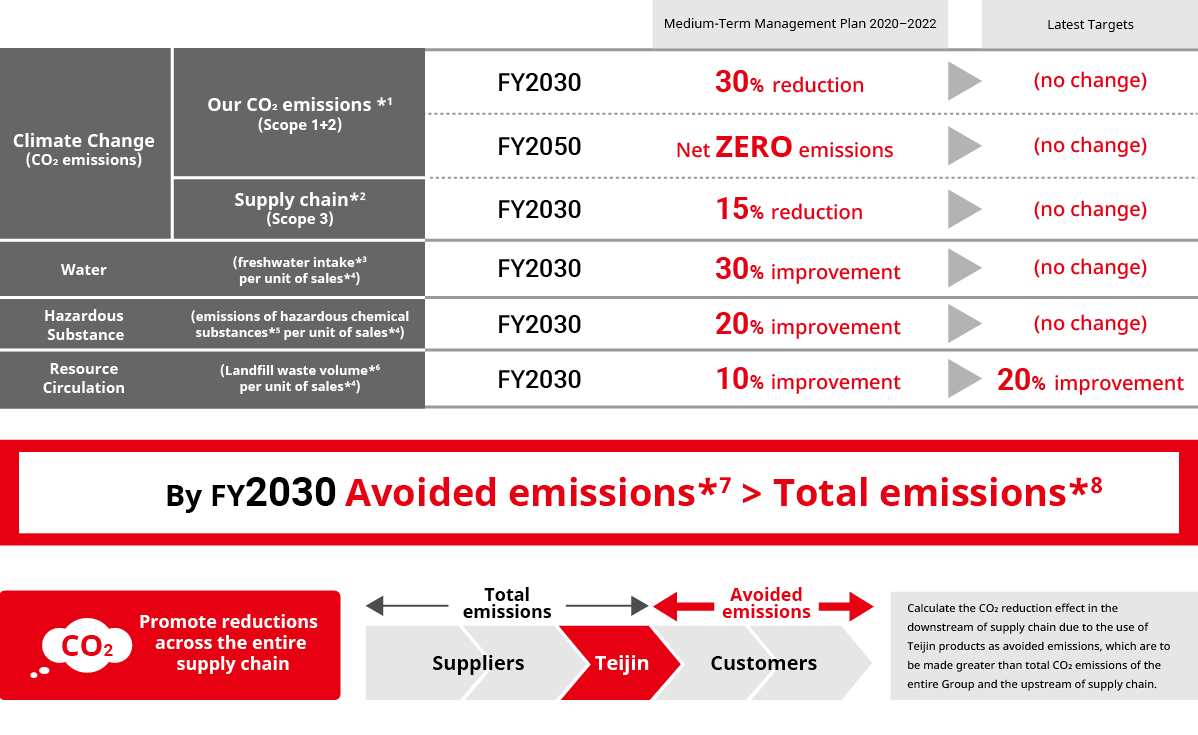
- *1Includes CO2, methane, and N2O. CO2 emissions are calculated with the GHG Protocol as reference. The amount of CO2 emissions equivalent to the amount of energy sold to other companies has not been deducted from this data. With regard to coefficients for fuel, we use emissions coefficients based on the Law Concerning the Promotion of the Measures to Cope with Global Warming. As for emissions coefficients for electricity, we use adjusted emissions coefficients of individual electric power companies for power purchased in Japan. For power purchased overseas, we use power company-specific coefficients, in principle. However, in cases where the power company-specific coefficient is unknown, we apply the latest available International Energy Agency (IEA) country-specific emissions coefficient
- *2Covers Scope 3 emissions in Category 1 (Purchased goods and services) except emissions from products purchased in the Fibers & Products Converting Business for the purpose of sale
- *3The amount of freshwater intake is the total of industrial water, groundwater, and tap water
- *4Per sales units are calculated using consolidated net sales as the denominator
- *5Among the Class 1 designated chemical substances under the Act on Confirmation, etc. of Release Amounts of Specific Chemical Substances in the Environment and Promotion of Improvements to the Management Thereof and chemical substances indicated by the Japan Chemical Industry Association, chemical substances emissions to atmosphere, water, and soil which are harmful to aquatic environments and the ozone layer in the Globally Harmonized System of Classification and Labelling of Chemicals (GHS) classification defined by the United Nations are subject to the calculation for emissions
- *6Landfill waste volume is calculated based on the amount of waste disposed of directly in landfills
- *7Calculated as the amount of avoided CO2 emissions that the Company's products have contributed to in the supply chain downstream
- *8Total CO2 emissions are calculated for Scope 1, Scope 2, and Category 1 (Purchased goods and services), Category 2 (Capital goods), Category 3 (Fuel- and energy-related activities not included in Scope 1 and Scope 2), Category 4 (Upstream transportation and distribution), Category 5 (Waste generated in operations), Category 6 (Business travel), and Category 7 (Employee commuting) in Scope 3
Human capital (including diversity of human resources)
In FY2023, we reestablished long-term targets in tandem with our move to reduce the number of corporate officers by transforming our management structure.
① KPIs and Targets under Medium-Term Management Plan 2020-2022
| KPIs | Targets | |||
|---|---|---|---|---|
|
Diversity of executives*1 |
Female executives | April 1, 2031 | 10+ | |
| Non-Japanese executives | April 1, 2031 | 12+ | ||
|
Key goals for women's advancements*2 |
Japan*3 |
Managers (or higher) | April 1, 2031 | 300+ |
| U.S. | Senior managers*4 | April 1, 2031 | 10 | |
| EU | Global core talent*5 | April 1, 2031 | 10 | |
| China | Senior managers*4 | April 1, 2031 | 12 | |
| ASEAN | Senior managers*4 | April 1, 2031 | 8+ | |
- *1Board of Directors, statutory auditors, Group executive officers, and Group corporate officers
- *2Key goals are set based on regional situations
- *3Major subsidiaries in Japan: Teijin Limited, Teijin Pharma Limited, Teijin Frontier Co., Ltd., Infocom Corporation
- *4President or those who report directly to the president in a Group company
- *5Human resources of female senior managers selected and certified as executive candidate
② KPIs and Targets from FY2023 Onward
| Milestones April 2026 |
Targets April 2031 |
||
|---|---|---|---|
| Female officers | |||
| Non-Japanese officers | |||
| Level of employee satisfaction | (Reference: Score of 64 in FY2022) |
||

